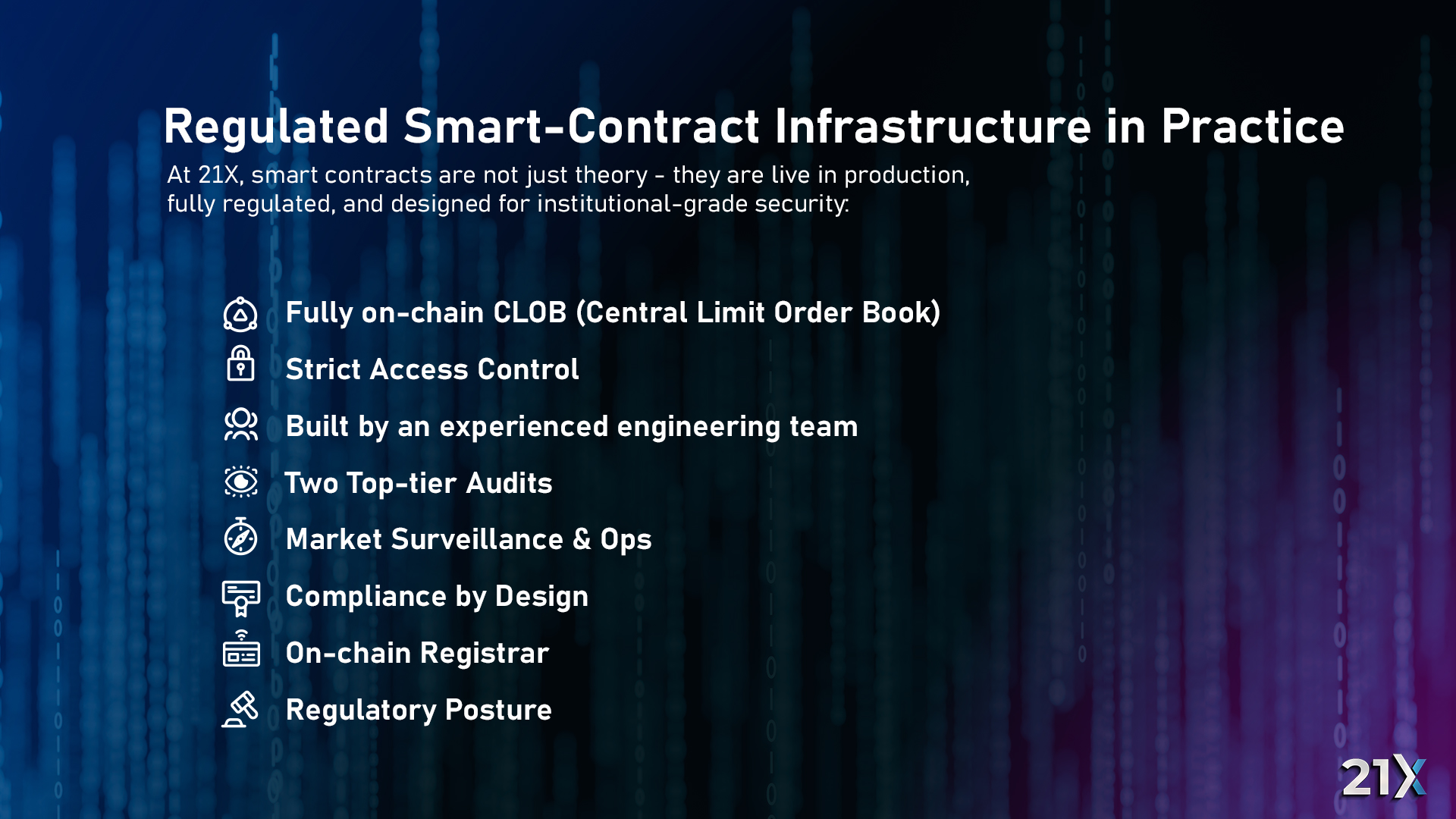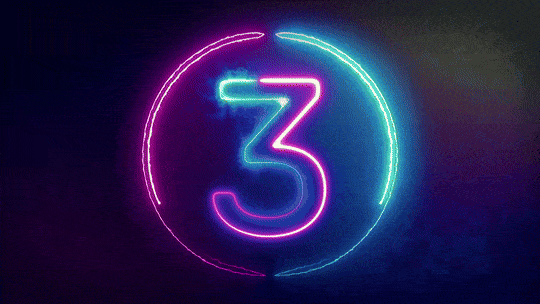In recent years, smart contracts have emerged as one of the most important innovations in digital finance. They promise a new era of efficiency, automation, and transparency. Yet, for these benefits to truly unfold, one element is indispensable: regulation. At 21X, we are convinced that innovation cannot succeed without security, compliance, and trust. These are the cornerstones of regulated market infrastructures and the basis on which smart contracts can evolve from a technological concept into a reliable pillar of global finance.
Smart contracts in the European regulatory framework
The European Union has taken a clear and forward-looking stance. With the DLT Pilot Regime (Regulation (EU) 2022/858), smart contracts are explicitly recognized as a foundational technology for trading and settling tokenized financial instruments. This regulation is not about slowing down innovation; it creates the guardrails that allow it to scale.
This progressive approach is complemented by MiCAR (Markets in Crypto-Assets Regulation) and by supervisory practices from ESMA, BaFin, and the Deutsche Bundesbank. Together, these frameworks establish that smart-contract-based infrastructures, when embedded in regulated environments, can form a secure and trustworthy backbone for digital finance.
In unregulated settings such as parts of decentralized finance, vulnerabilities are well known. Reentrancy attacks, composability issues, or the inability to manage upgrades can lead to serious losses. But within a regulated framework, these risks are mitigated by governance rules, mandatory audits, compliance checks, and continuous supervisory oversight. What once was considered speculative technology is transformed into an institutional-grade tool, paving the way for adoption at scale.
21X: from theory to practice
While many still debate the potential of smart contracts, 21X has already brought them into live, regulated production. As the first fully licensed trading and settlement venue under the EU DLT Pilot Regime, we prove that smart contracts are not just “innovative code.” They are the foundation of a compliant, secure, and efficient market infrastructure, purpose-built to meet institutional requirements.
At the core of our infrastructure is a fully on-chain central limit order book (CLOB). Order entry, matching, and settlement are executed entirely on the blockchain for security-token-to-stablecoin pairs. Deterministic matching and atomic settlement guarantee integrity and eliminate reconciliation gaps. There are no shadow books and no reliance on off-chain processes.
Access to the platform is tightly controlled. Only whitelisted wallets can interact with the contracts. Permissions are defined by clear role models, administrator keys are secured with multi-signature protections, and an integrated emergency circuit breaker allows the system to be paused in case of anomalies.
Our smart contracts are developed by a engineering team following the highest industry standards. This includes the use of checks-effects-interactions, reentrancy guards, overflow-safe mathematics, minimized external calls, and an invariant-led design. Security is further strengthened by independent scrutiny. Two top-tier audit firms have reviewed the entire codebase. All findings were remediated, re-verified, and a public audit summary is in preparation to ensure transparency.
Operational resilience is ensured by 24/7 monitoring. Every transaction, order cancellation, and fill are continuously observed. Anomaly detection systems are backed by detailed runbooks, and redundancy as well as failover procedures are in place to secure uninterrupted service.
Compliance is built into the design of our platform. All participants undergo thorough KYC and AML checks, sanctions screening, and PEP verification. This ensures that every participant acts within the boundaries of financial regulation.
A further innovation is our on-chain registrar, which records legal ownership directly on the blockchain and links it to verified identities in a transparent way. This enables also corporate actions such as dividend distributions, shareholder votes, or stock splits to be executed natively on-chain, while ensuring full reconciliation with the off-chain legal wrapper.
All of this operates within a clear regulatory posture. Our activities are anchored in the EU and German legal frameworks, and we have received formal no-objections from BaFin, ESMA, and the Deutsche Bundesbank. Through active and continuous dialogue with supervisors, we ensure that compliance is not a one-off certification but an ongoing process.
Why regulation matters
The risks of smart contracts are often emphasized in public debates. These risks are real, but they must be put in context. A smart contract is only as safe as the framework in which it operates. Unregulated ecosystems may be innovative, but they lack the safeguards needed for systemic stability. Regulated infrastructures like 21X combine the benefits of automation with governance, oversight, and accountability.
The common belief that regulation slows innovation is misleading. In truth, regulation enables innovation. By embedding smart contracts in the legal and supervisory fabric of the European financial system, regulators have provided a safe pathway for their adoption. The licensing of 21X under the DLT Pilot Regime demonstrates that this path is both viable and effective – and could serve as a blueprint for financial market infrastructures worldwide.
Conclusion
At 21X, we show that smart contracts are far more than a technological novelty. They are a core component of a regulated, secure, and trusted financial infrastructure. Through independent audits, strong governance frameworks, permanent monitoring, and continuous supervisory engagement, we ensure that risks are managed, allowing the true benefits – speed, transparency, and efficiency – to be realized.
Regulators themselves have acknowledged smart contracts as a cornerstone of the future financial system. With the right design, governance, and oversight, the benefits clearly outweigh the risks. This is why 21X is already operating today as the first fully licensed smart-contract-based trading and settlement venue under the EU DLT Pilot Regime.
Innovation requires regulation – and 21X delivers both.
Author: Jakob Bosshard Head of Business Operations @21X



